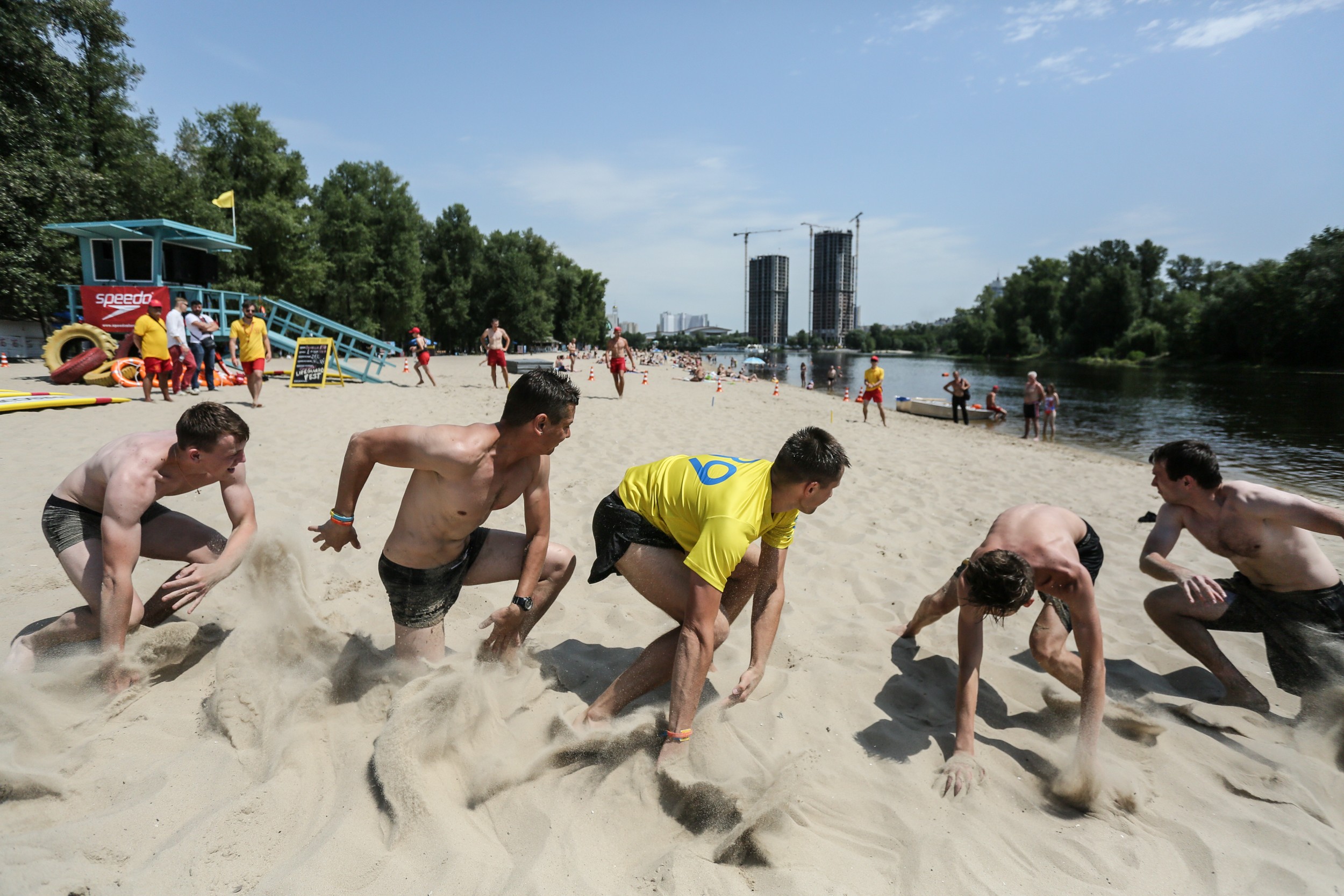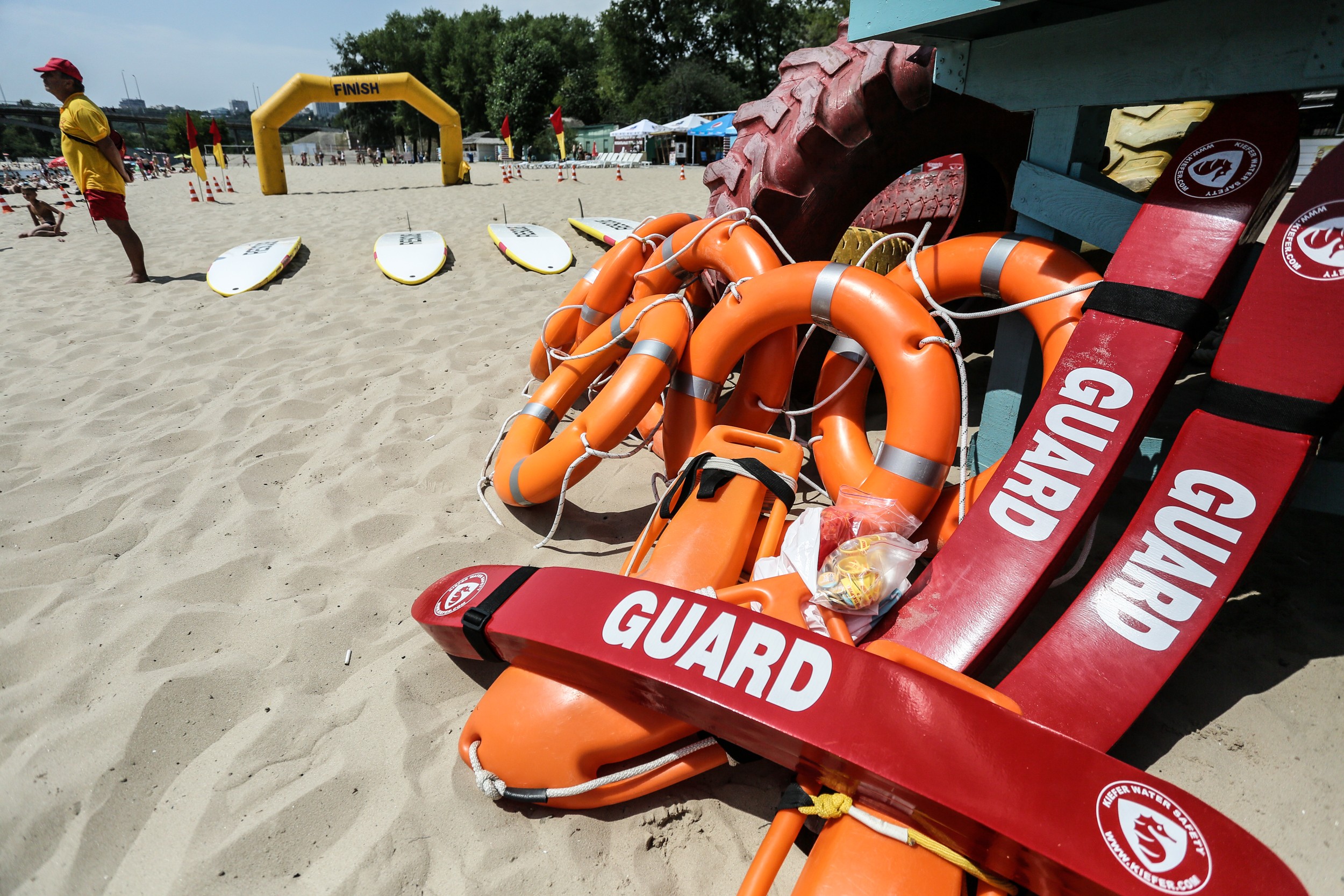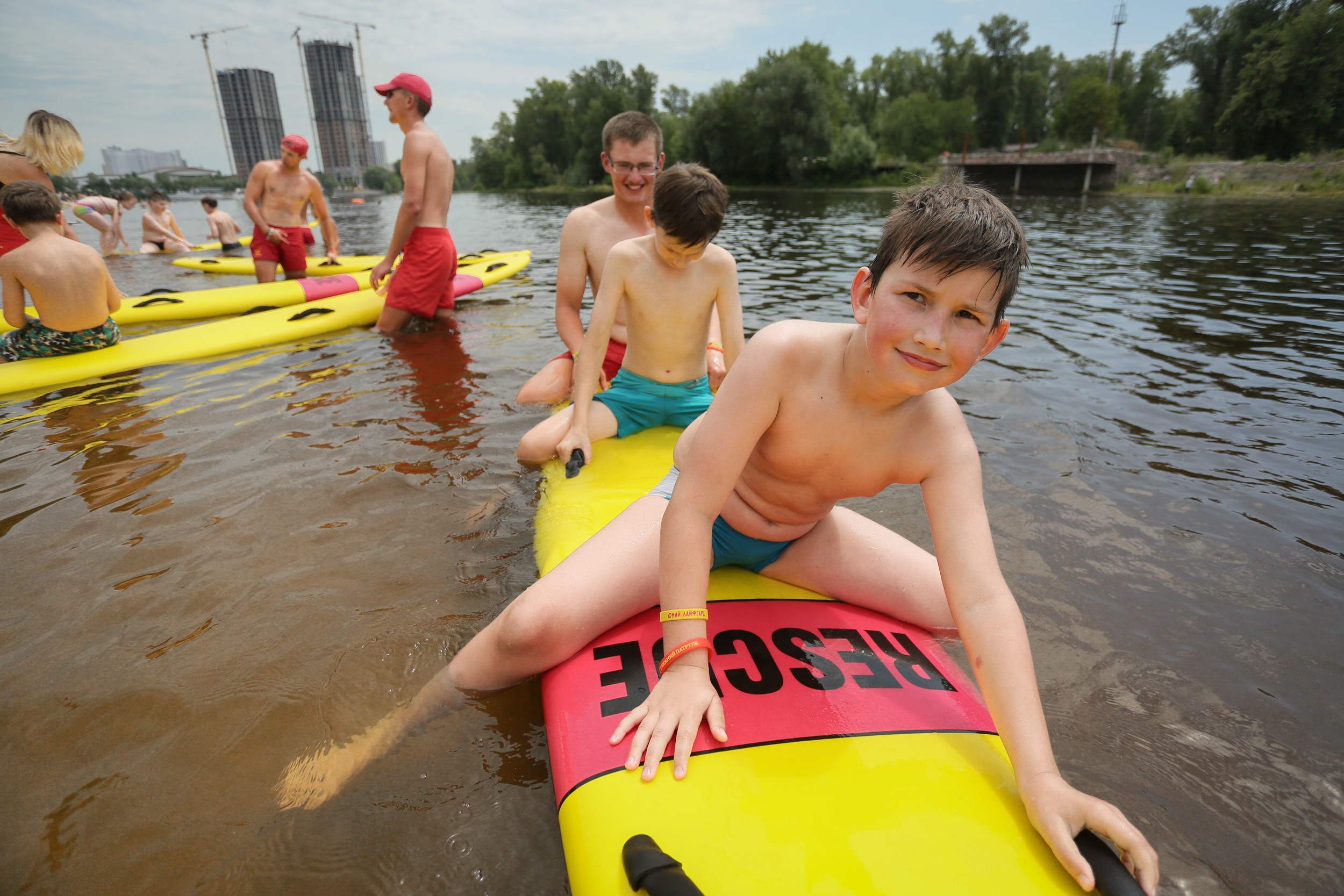Valeria Shelukhina, an 18-year-old student from Kyiv, came across a notice in spring advertising “the best summer job.”
She applied immediately, passed the required tests and was hired in May. Her job equipment: a swimsuit, swimming shorts and a whistle.
That’s because Shelukhina, a former professional swimmer, is now a lifeguard of the Kyiv’s Beach Patrol, patrolling Venetian Beach in Hydropark, the island park on Kyiv’s Dnipro River.
She hasn’t had to pull anyone from the water yet, and for a lifeguard, that’s a good sign, she says.
“We even have a saying: ‘A good lifeguard is a dry lifeguard,’” Shelukhina says. “It’s better to issue a hundred warnings than have to fish a drunk person out of the water.”
This year, as of July 10, Kyiv’s lifeguards and emergency service’s workers have saved 64 people from drowning. Up to 22 people have drowned in Kyiv so far in 2017, according to the Emergency Service of Ukraine.
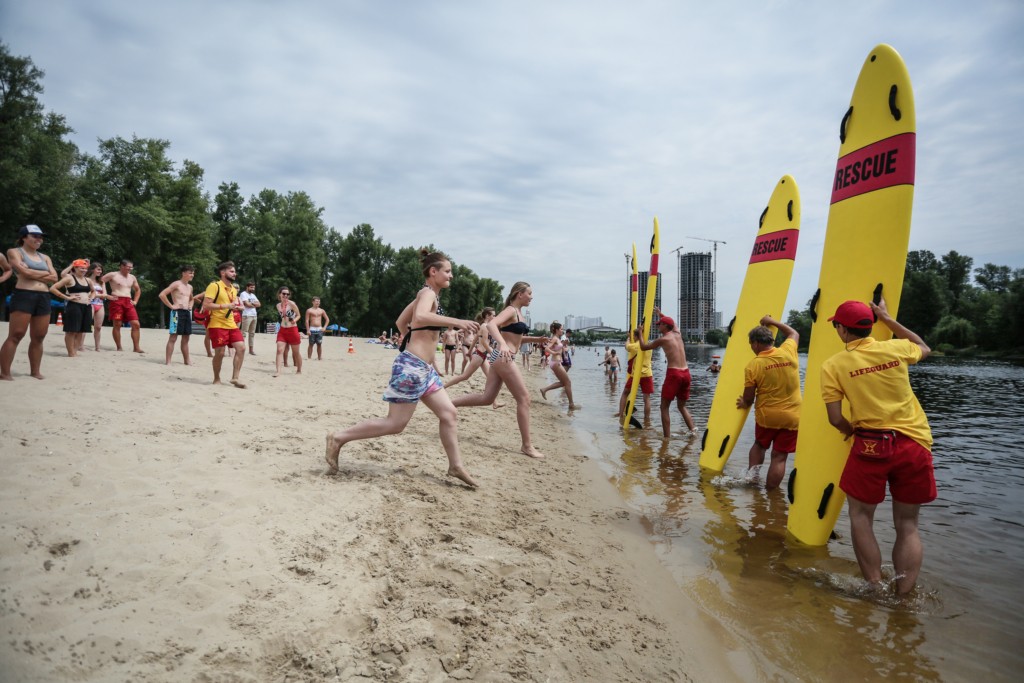
People participate in contests at Lifeguard Fest 2017, an event held by Kyiv Beach Patrol lifeguards, in Kyiv on July 1. (Oleg Petrasiuk)
Shocking numbers
Last year, 57 people drowned in Kyiv, while Kyiv’s lifeguards saved 114 people, 26 of whom were children. Countrywide, 1,300 people drowned in Ukraine in 2016. However, that’s a big improvement on just two years before, in 2014, when 2,220 people drowned in Ukraine’s rivers, seas, lakes and waterways, according to Ukraine’s Emergency Service.
But the numbers of drowning victims also depend on who you talk to: according to a report by World Health Organization, about 3,000 people drowned in Ukraine in 2014, which put Ukraine in an unenviable sixth place in the organization’s list of 117 states by a number of drownings.
Compare that with the United States, which has oceans to the east and west, major rivers and lakes, and a population of 320 million people. According to the same WHO report, 4,812 people drowned in the United States in 2014, and from 2005 to 2014 there were an average of 3,536 drownings annually in the United States, according to U.S. government statistics.
The drowning numbers in Ukraine shocked Artem Galchuk, 27, when he returned to Ukraine from the United States, where he had spent four months working as a lifeguard for the Galveston Island Beach Patrol in Texas.
So in the summer of 2015 Galchuk, who moved to Kyiv and took a job with the reformed patrol police, together with 30 volunteers started patrolling the city’s beaches on weekends.
Kyiv’s Baywatch
The Kyiv authorities noted the team’s effort, and invited the volunteers, who had already registered a non-government organization Beach Patrol Kyiv, to reform the state-owned municipal beach patrolling service.
Now the athletic lifeguards of the Beach Patrol, which has been informally dubbed “Kyiv’s Baywatch” after the popular 1990s U.S. drama series “Baywatch,” keep an eye on most of the capital’s beaches.
This year more than 450 people applied for the position of lifeguard, but only 120 got jobs with the beach patrol.
The selection process was tough: those who wanted to join the Beach Patrol had to pass swimming tests and an interview. Those who got past that stage had to complete a two-week course training to work with various lifesaving equipment and on quickly identifying people in imminent danger of drowning.
Galchuk says that most of the lifeguards are students from Kyiv’s top universities, such as Taras Shevchenko National University and Kyiv National Economic University.
According to him, students see this job as a way to help other people while making good money: a lifeguard in a full-time position earns up to Hr 10,000 a month, depending on how many hours they work.
For many, working in the Beach Patrol also looks good on their resume, because many international companies look for people who have experience in the non-government sector.
Grateful to be saved
Oleksandr Govorun, a lifeguard and a fitness instructor, said he decided to join the Beach Patrol because he wanted to make sure that children are safe on the beaches. A father of two, he didn’t want his children to swim at Kyiv’s beaches, because he was concerned about their safety.
Now Govorun’s family often comes to the beaches where he works.
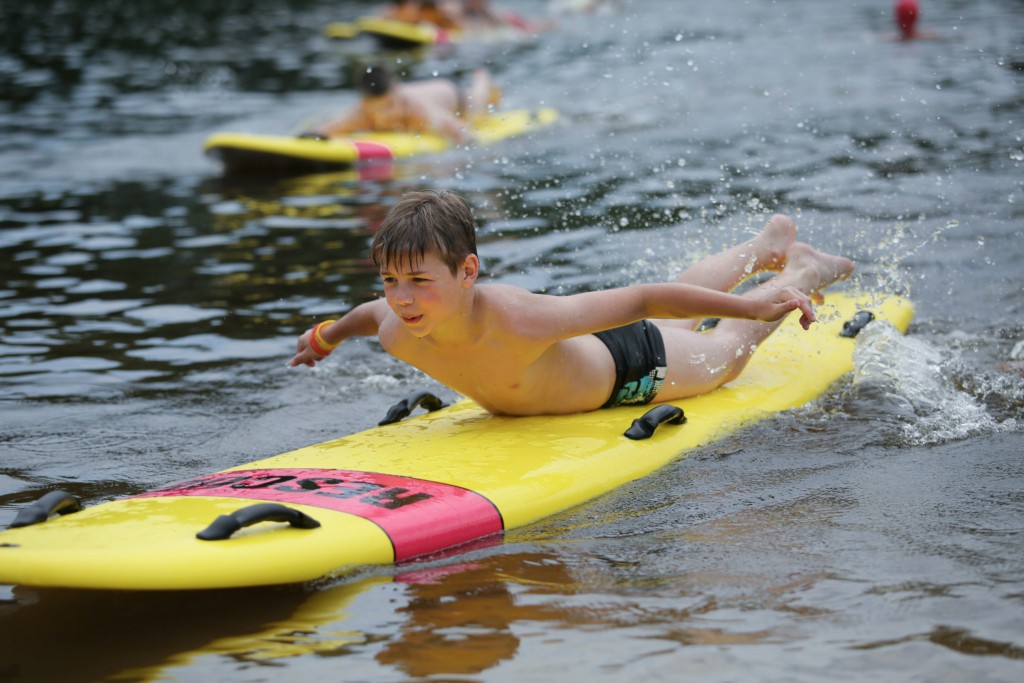
Boys are swimming on rescue board at Lifeguard Fest 2017, an event held by Kyiv Beach Patrol lifeguards, in Kyiv on July 1. (Oleg Petrasiuk)
“What I appreciate most about the Beach Patrol is its professional approach,” Govorun said, adding that lifeguards not only watch after the people in the water, but also keep order on a beach, including preventing alcohol abuse.
In fact, this could be the most difficult part of lifeguard’s job, according to Shelukhina, because people continue to drink and smoke on public beaches, despite it being prohibited by the law.
She said that couple of times she had had to call the police because people reacted aggressively when told they were breaking the law and were asked to stop.
And according to Galchuk, this year a drunk woman attacked one of the lifeguards working in Kyiv’s Holosiivsky district.
Galchuk also said that unlike last year, the police don’t now always come when lifeguards call, saying that they have more important cases and don’t have enough staff to come and to fine people for drinking on the beach.
Still, Shelukhina said that despite the occasional conflict, talking to people might be the most pleasant part of a lifeguard’s job. The Beach Patrol often holds various sports events and alcohol-free beach parties to promote a healthy lifestyle.
“And I’m very happy when people come to me and say ‘thank you for being here, and keeping us safe,’” Shelukhina said.
